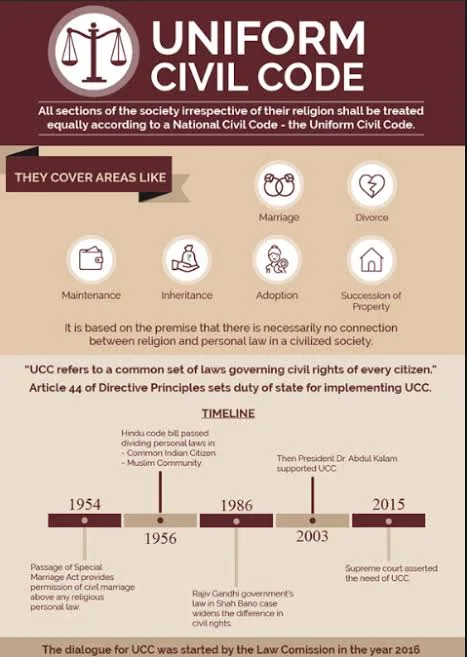| CONTEXT: The Prime Minister, speaking from Red Fort on Independence Day, calls for a “Secular Civil code.” |
What is a Uniform Civil Code?
A uniform civil code is a single set of laws that apply to all religious organizations nationwide for their private affairs, including marriage, divorce, inheritance, adoption, and other problems.
It is meant to take the place of the current system of fragmented personal rules that regulate interpersonal relationships and related issues among various religious communities.
- Article 44 of the Indian Constitution, which is a part of the Directive Principles of State Policy, refers to the Uniform Civil Code.
- These recommendations are not legally obligatory, but they are meant to guide the state in developing policies.
- While some have supported it as a way to advance national unity and gender equity, others have denounced it as a threat to religious freedom and pluralism.
- Goa, which was freed from Portuguese dominion in 1961, kept its common family law, known as the Goa Civil Code, and is the only state in India with a UCC.
- The inhabitants of the rest of India follow different personal laws based on their religious or communal identity.
Personal Laws in India:
Topics related to personal law, including inheritance, divorce, and marriage, are under the Constitution’s concurrent list.
Any of the topics listed in the Concurrent List is subject to legislation made by both the state legislature and the Parliament.
- The Parliament of 1956 codified the personal laws of Hindus into four sections:
The 1955 Hindu Marriage Act
The 1956 Hindu Succession Act
Act of 1956 Concerning Hindu Minority and Guardianship
The Act of 1956 on Hindu Adoption and Maintenance - For these regulations, Sikhs, Jains, and Buddhists are also referred to as “Hindus.”
- Muslim personal laws are based on their religious texts rather than being codified in and of themselves, though some aspects are explicitly recognized in laws like the Muslim Women (Protection of Rights on Marriage) Act of 2019 and the Shariat Application Act of 1937 and 1939.
- Jews, Zoroastrians, and Christians are likewise subject to their own set of customs and regulations.
What Advantages Does UCC Offer?
a. National Integration and Secularism: By giving all citizens a shared identity and a sense of community, UCC would support national integration and secularism.
Additionally, it would lessen disputes between communities and sects brought on by disparate personal laws.
The principles of equality, fraternity, and human dignity for all would be upheld.
- Gender Justice and Equality: By eliminating the injustice and oppression that women experience under numerous personal laws, UCC will ensure gender justice and equality.
Women would be accorded equal status and rights in relation to marriage, divorce, inheritance, adoption, maintenance, and other issues.
Additionally, it would give women the confidence to oppose backward and patriarchal practices that infringe upon their fundamental rights. - Simplifying and Rationalizing the Legal System: By eliminating the inconsistencies and complexity of several personal laws, UCC would rationalize and simplify the legal system.
By eliminating the inconsistencies and gaps brought about by disparate personal laws, it would harmonize criminal and civil laws.
It would help the general public comprehend and be more accessible to the law. - Reform and Modernization of Outdated and Regressive Practices: The UCC would update and modernize the outmoded and regressive practices that are found in certain personal laws.
It will put an end to customs like triple talaq, polygamy, child marriage, and other behaviours that are incompatible with the ideals and human rights guaranteed by the Indian Constitution.
Additionally, it would adapt to the shifting goals and social realities of the populace.
Which Cases Are Significant to UCC?
In the 1985 case of Shah Bano Begum v. Mohammad Ahmed Khan, the Supreme Court affirmed a Muslim woman’s ability to sue her husband for maintenance under Section 125 of the Criminal Procedure Code, even after the Iddat period had passed.
It also noted that the elimination of ideological inconsistencies would be facilitated by a UCC.
In Sarla Mudgal v. Union of India (1995), the Supreme Court ruled that a Hindu spouse could not become an Islamic convert and then get remarried without first divorcing his previous wife.
It further claimed that bigamous marriages and other fraudulent conversions would be avoided by a UCC.
In the 2017 case of Shayara Bano v. Union of India, the Supreme Court ruled that the triple talaq practice violated Muslim women’s equality and dignity and was therefore unconstitutional.
It also suggested that a legislation governing Muslim marriages and divorces be passed by the Parliament.
ASSOCIATED CHALLENGES :
- Differentiated Personal Laws and Customs:
India is a nation with many different cultures, religions, and customs.
Civil concerns are governed by the personal laws and customs of each community.
Regions, sects, and groupings all have rather different laws and customs.
Finding consistency and common ground in the midst of such variation is quite challenging. - Opposition from Religious and Minority Groups: A lot of these groups believe that UCC violates their right to cultural autonomy and freedom of religion.
Additionally, they contend that UCC would infringe upon their constitutional rights under Article 25, which protects the freedom of conscience as well as the ability to practice, profess, and propagate any religion. - Lack of Political Will and Consensus: To launch and carry out UCC, there is insufficient political will and consensus among the administration, legislature, judiciary, and civil society.
Concerns have also been raised about the possibility that UCC may incite social unrest and communal strife. - Practical Difficulties and Complexities: The many personal laws and practices in India would need to be extensively drafted, codified, harmonized, and rationalized in order to implement UCC.
It would necessitate extensive stakeholder input and involvement, including women’s organizations, legal professionals, and religious leaders.
To guarantee adherence and public acceptance of UCC, there would also need to be a strong enforcement and awareness apparatus.
The Way Ahead
People should be encouraged to view the world progressive and open-mindedly in order to understand the spirit of the UCC. To do this, campaigns for sensitization, education, and awareness must be launched.
Discriminatory personal laws ought to be changed or repealed in the interim.
In its 2018 study titled “Reform of Family Law,” the Law Commission said that maintaining the diversity of personal laws while making sure they do not conflict with fundamental rights would be the best course of action.
The paper proposed that rather than imposing a Uniform Civil Code, one can arrive at some universal principles that promote equality by codifying various personal laws.
विनाशकारी (highly active and destructive) हो सकता है।
Explore our courses: https://apnipathshala.com/courses/
Explore Our test Series: https://tests.apnipathshala.com/










